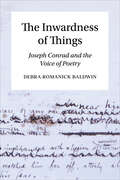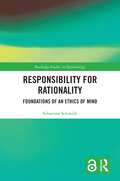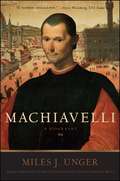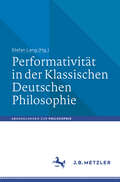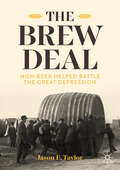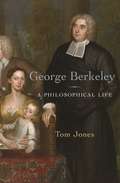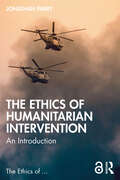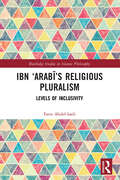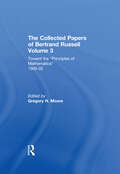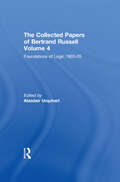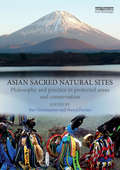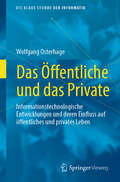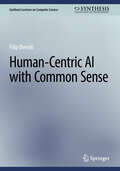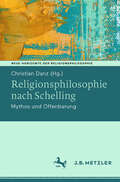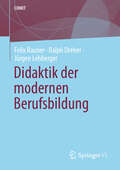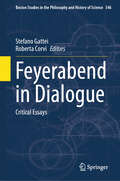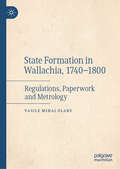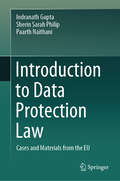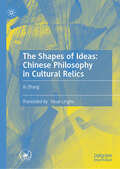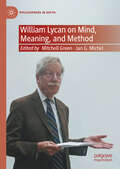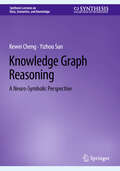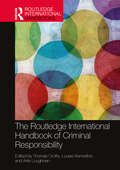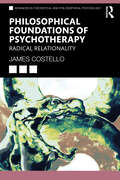- Table View
- List View
The Inwardness of Things: Joseph Conrad and the Voice of Poetry
by Debra Romanick BaldwinThe Inwardness of Things considers Joseph Conrad as a modern voice in an ancient and enduring quarrel between the poets and the philosophers. Beginning from the polemical poetics of his 1897 preface, Debra Romanick Baldwin focuses on Conrad’s distinctively poetic “inward” approach to truth – an inwardness that is found in lived experience, in language, and in the world beyond the individual. The book traces Conrad’s poetic voice from the rhetoric of his private letters to the narrative techniques of his fiction and finally to his explicit engagement with abstract approaches to truth. Baldwin applies narrative and rhetorical analysis to Conrad’s private correspondence, showing how he encouraged fellow writers – John Galsworthy, F. Warrington Dawson, R.B. Cunninghame Graham, Ted Sanderson, and Edward Noble – to engage with the inwardness of their own experience. The book explores how Conrad crafted moments of narrative solidarity in his fictional narratives to evoke the experience of the inwardness of another, while also considering his explicit polemics against abstract approaches to truth-seeking. Mindful of the colonial, late Victorian, Polish Romantic, and cosmopolitan contexts in which Conrad wrote, The Inwardness of Things nevertheless situates him in a broader human conversation that he himself invited and argues for the enduring value of his art.
Responsibility for Rationality: Foundations of an Ethics of Mind (Routledge Studies in Epistemology)
by Sebastian SchmidtThis book develops the foundations of an ethics of mind by investigating the responsibility that is presupposed by the requirements of rationality that govern our attitudes. It thereby connects the most recent research on responsibility and rationality in a unifying dialectic.How can we be responsible for our attitudes if we cannot normally choose what we believe, desire, feel, and intend? This problem has received much attention during the last decades, both in epistemology and ethics. Yet, its connections to discussions about reasons and rationality have been largely overlooked. The book has five main goals. First, it reinterprets the problem of responsibility for attitudes as a problem about the normativity of rationality. Second, it connects substantive and structural rationality by drawing on debates about responsibility. Third, it supports recent accounts of the normativity of rationality by explicitly defending the view that epistemic reasons and other ‘right‑kind’ reasons are genuine normative reasons, and it does so by drawing on recent discussions about epistemic blame. Fourth, it breaks the stalemate between rationalist and voluntarist accounts of mental responsibility by proposing a hybrid view. Finally, it argues that being irrational can warrant moral blame, thus revealing an unnoticed normative force of rational requirements.Responsibility for Rationality is an original and essential resource for scholars and advanced students interested in connecting strands of normative theory within epistemology, metaethics, and moral psychology.The Open Access version of this book was published with the support of the Swiss National Science Foundation.
Machiavelli: A Biography
by Miles J. UngerHe is the most infamous and influential political writer of all time. His name has become synonymous with cynical scheming and the selfish pursuit of power. Niccolò Machiavelli, Florentine diplomat and civil servant, is the father of political science. His most notorious work, The Prince, is a primer on how to acquire and retain power without regard to scruple or conscience. His other masterpiece, The Discourses, offers a profound analysis of the workings of the civil state and a hardheaded assessment of human nature. Machiavelli’s philosophy was shaped by the tumultuous age in which he lived, an age of towering geniuses and brutal tyrants. He was on intimate terms with Leonardo and Michelangelo. His first political mission was to spy on the fire-and-brimstone preacher Savonarola. As a diplomat, he matched wits with the corrupt and carnal Pope Alexander VI and his son, the notorious Cesare Borgia, whose violent career served as a model for The Prince. His insights were gleaned by closely studying men like Julius II, the “Warrior Pope,” and his successor, the vacillating Clement VII, as well as two kings of France and the Holy Roman Emperor. Analyzing their successes and failures, Machiavelli developed his revolutionary approach to power politics. Machiavelli was, above all, a student of human nature. In The Prince he wrote a practical guide to the aspiring politician that is based on the world as it is, not as it should be. He has been called cold and calculating, cynical and immoral. In reality, argues biographer Miles Unger, he was a deeply humane writer whose controversial theories were a response to the violence and corruption he saw around him. He was a psychologist with acute insight into human nature centuries before Freud. A brilliant and witty writer, he was not only a political theorist but also a poet and the author of La Mandragola, the finest comedy of the Italian Renaissance. He has been called the first modern man, unafraid to contemplate a world without God. Rising from modest beginnings on the strength of his own talents, he was able to see through the pious hypocrisy of the age in which he lived. Miles Unger has relied on original Italian sources as well as his own deep knowledge of Florence in writing this fascinating and authoritative account of a genius whose work remains as relevant today as when he wrote it.
Performativität in der Klassischen Deutschen Philosophie (Abhandlungen zur Philosophie)
by Stefan LangPerformativität spielt avant la lettre in der Klassischen Deutschen Philosophie eine bedeutende Rolle. Sie ist u.a. ein zentraler Bestandteil originärer Interpretationen des Absoluten, des Subjekts oder auch des Wissens. Seit den 2010er Jahren mehren sich daher Untersuchungen, die dem Performativen bei Kant, Fichte, Schelling, Hegel und in der Frühromantik nachspüren. Dieser Sammelband greift diese Entwicklung auf. Anhand interdisziplinärer Beiträge wird Performativität innerhalb der Klassischen Deutschen Philosophie erläutert und diskutiert. Dabei wird der hermeneutische und systematische Ertrag performativer Interpretationen dargestellt.
The Brew Deal: How Beer Helped Battle the Great Depression
by Jason E. TaylorDuring the final stages of Prohibition, the US government allowed the consumption and sale of “non-intoxicating” beer, which was at or below 3.2% alcohol-by-weight. Beer’s return—permitted with an eye toward job creation during the Great Depression—was one of President Franklin D. Roosevelt’s earliest New Deal policies. In this book, economic historian Jason E. Taylor takes readers through the rapid resurgence of American breweries and shows how beer helped spark a sharp recovery in the spring of 1933. Taylor begins with stories of how the nation’s 1,400 breweries were decimated by the onset of Prohibition in 1920. He then turns to the frothy debates that led Congress to declare 3.2 beer “non-intoxicating,” and hence allowable under Prohibition. While April 7th is now celebrated as “National Beer Day,” the original April 7th—when legal beer returned after more than 13 years away—brought raucous scenes that make today’s Mardi Gras festivities seem tame by comparison. The Brew Deal shares stories of breweries, people, politics, perseverance, and the various roles that 3.2 beer has played in the evolving American beer scene.
George Berkeley: A Philosophical Life
by Tom JonesA comprehensive intellectual biography of the Enlightenment philosopherIn George Berkeley: A Philosophical Life, Tom Jones provides a comprehensive account of the life and work of the preeminent Irish philosopher of the Enlightenment. From his early brilliance as a student and fellow at Trinity College Dublin to his later years as Bishop of Cloyne, Berkeley brought his searching and powerful intellect to bear on the full range of eighteenth-century thought and experience.Jones brings vividly to life the complexities and contradictions of Berkeley’s life and ideas. He advanced a radical immaterialism, holding that the only reality was minds, their thoughts, and their perceptions, without any physical substance underlying them. But he put forward this counterintuitive philosophy in support of the existence and ultimate sovereignty of God. Berkeley was an energetic social reformer, deeply interested in educational and economic improvement, including for the indigenous peoples of North America, yet he believed strongly in obedience to hierarchy and defended slavery. And although he spent much of his life in Ireland, he followed his time at Trinity with years of travel that took him to London, Italy, and New England, where he spent two years trying to establish a university for Bermuda, before returning to Ireland to take up an Anglican bishopric in a predominantly Catholic country.Jones draws on the full range of Berkeley’s writings, from philosophical treatises to personal letters and journals, to probe the deep connections between his life and work. The result is a richly detailed and rounded portrait of a major Enlightenment thinker and the world in which he lived.
The Ethics of Humanitarian Intervention: An Introduction (The Ethics of ...)
by Jonathan ParryFew topics generate as much controversy and debate as armed humanitarian intervention. Military force involves death and destruction, as well as interfering in other countries’ domestic affairs. But, crucially, non-intervention is also controversial. When confronted with humanitarian crises abroad, many feel that outsiders are not only justified in using force to halt the abuses, but that they must do so. The Ethics of Humanitarian Intervention: An Introduction offers a guide to these ethical debates.In clear and informative style Jonathan Parry explores the following topics: The morality of defending others, including the ‘responsibility to protect’ (R2P). State sovereignty and self-determination as barriers to intervention. The possibility of consensual intervention. Just causes for intervention: what kinds of human rights abuses warrant intervention? The effectiveness of intervention: does it work in practice? Alternatives to intervention, including aiding rebels, economic sanctions, and providing aid. Whether there is a duty to intervene. Examples of intervention – including the former Yugoslavia, Iraq, Liberia, and Libya – are used to illustrate the ethical dilemmas in question. The arguments of important theorists of intervention, such as John Stuart Mill, Michael Walzer and Jeff McMahan, are also explained clearly and critically. Each chapter concludes with questions for discussion and reflection. The Ethics of Humanitarian Intervention: An Introduction is ideal reading for students and researchers in philosophy, applied ethics, politics and international relations.Chapter 3 of this book is freely available as a downloadable Open Access PDF at http://www.taylorfrancis.com under a Creative Commons Attribution (CC-BY) 4.0 license.
Ibn ‘Arabī’s Religious Pluralism: Levels of Inclusivity (Routledge Studies in Islamic Philosophy)
by Faris Abdel-hadiThis book marks a significant contribution to the debate around Ibn ʿArabī’s religious pluralism, focusing on his multifaceted approach to non-Abrahamic religions.For nearly eight hundred years, the writings and ideas of the great Spanish Sufi master Ibn ʿArabī have shaped Islamic intellectual and spiritual culture, from North and West Africa and France on the one hand, to Iran, the Levant, Central Asia, and the Far East on the other. Modern scholarship on the “Greatest Master” is consequently at an all-time high. This book weighs in on a well-known aspect of his religious worldview, namely his perspective on religious pluralism, but does so from an entirely different angle. Offering a very close reading of his major works, newly translated by the author, and paying particular attention to a highly developed celestial metaphor prompted by his encounter with a group of pagan sun-worshippers, the book offers new insights into the nature and scope of Ibn ʿArabī’s understanding of Islamic inclusivism. Ultimately, the book contributes to our understanding of both interfaith dialogue and the history of world religions through the prism of Ibn ʿArabī’s work.The book will be of particular interest to students and scholars working in a range of fields, including Islamic philosophy, Sufism, and intellectual history.
The Collected Papers of Bertrand Russell, Volume 3: Toward the 'Principles of Mathematics' 1900-02 (The Collected Papers of Bertrand Russell)
by Gregory H. MooreThis volume shows Russell in transition from a neo-Kantian and neo-Hegelian philosopher to an analytic philosopher of the first rank. During this period his research centred on writing The Principles of Mathematics where he drew together previously unpublished drafts. These shed light on Russell's paradox. This material will alter previous accounts of how he discovered his paradox and the related paradox of the largest cardinal. The volume also includes a previously unpublished draft of an early attempt to solve his paradox, as well as the earliest known version of his generalised relation arithmetic. It contains three articles which have never previously been published in English.
The Collected Papers of Bertrand Russell, Volume 4: Foundations of Logic, 1903-05 (The Collected Papers of Bertrand Russell)
by Bertrand RussellThis volume covers the period from the beginning of Whitehead and Russell's work on Volume 2 of the Principles of Mathematics to the critical discovery of the theory of descriptions in 1905. The volume contains a large number of unpublished manuscripts which give a vivd picture of Russell wrestling with the logical paradoxes, often unsuccessfully, as he tries out one foundational scheme after another. Previously unpublished work in the theory of denoting is included, which predates the famous article of 1905. This volume also gathers together several manuscripts on the so-called 'zig-zag' theory with which Russell attempted to provide a type-free foundation for mathematics. A number of reviews and survey articles, together with two talks on modality and truth, are also published for the first time.
Asian Sacred Natural Sites: Philosophy and practice in protected areas and conservation
by Bas Verschuuren Naoya FurutaNature conservation planning tends to be driven by models based on Western norms and science, but these may not represent the cultural, philosophical and religious contexts of much of Asia. This book provides a new perspective on the topic of sacred natural sites and cultural heritage by linking Asian cultures, religions and worldviews with contemporary conservation practices and approaches.The chapters focus on the modern significance of sacred natural sites in Asian protected areas with reference, where appropriate, to an Asian philosophy of protected areas. Drawn from over 20 different countries, the book covers examples of sacred natural sites from all of IUCN’s protected area categories and governance types. The authors demonstrate the challenges faced to maintain culture and support spiritual and religious governance and management structures in the face of strong modernisation across Asia.The book shows how sacred natural sites contribute to defining new, more sustainable and more equitable forms of protected areas and conservation that reflect the worldviews and beliefs of their respective cultures and religions. The book contributes to a paradigm-shift in conservation and protected areas as it advocates for greater recognition of culture and spirituality through the adoption of biocultural conservation approaches.
Das Öffentliche und das Private: Informationstechnologische Entwicklungen und deren Einfluss auf öffentliches und privates Leben (Die blaue Stunde der Informatik)
by Wolfgang OsterhageTechnologische Entwicklungen beeinflussen öffentliches Leben in Politik und Wirtschaft, aber auch unser eigenes, privates Dasein. Gewollt oder ungewollt kommen wir täglich – und sogar des Nachts, wenn wir schlafen – mit Technologien in Berührung, die wir selbst nur bedingt kontrollieren können oder wollen. Es gibt keine Lebenslage, in denen eine Berührung mit elektronischen Systemen nicht gegeben ist. Insofern hat die Menschheit ihre informatorische Unschuld für immer verloren, bis hin zum Missbrauch persönlichen Identitäten in sozialen Netzen, in denen ein Leben in Scheinidentitäten stattzufinden scheint. Information und Kommunikation sind Wirtschaftsfaktoren geworden, die am Ende des Industriezeitalters und am Beginn des Wissenszeitalters zu stehen scheinen. Das technisch Hergestellte wird dem Organischen immer ähnlicher. Natur und Maschinen verschmelzen und entziehen sich unserer Kontrolle. Man tut, was dem System nutzt. Das Leben wird zu einer Risiko- und Wahrscheinlichkeitsrechnung, und das Ich nur noch zu einem Interface.
Human-Centric AI with Common Sense (Synthesis Lectures on Computer Science)
by Filip IlievskiThis book enables readers to understand the challenges and opportunities of developing human-centered AI with commonsense reasoning abilities. Despite apparent accuracy improvements brought by large neural models across task benchmarks, common sense is still lacking. The lack of common sense affects many tasks, including story understanding, decision-making, and question answering. Commonsense knowledge and reasoning have long been considered the “black matter” of AI, raising concerns about the trustworthiness and applicability of AI methods in both autonomous and hybrid applications. This book describes how to design a more robust, collaborative, explainable, and responsible AI through incorporating neuro-symbolic commonsense reasoning. In addition, the book provides examples of how these properties of AI can facilitate a wide range of social-good applications in digital democracy, traffic monitoring, education, and robotics. What makes commonsense reasoning such a unique and impactful challenge? What can we learn from cognitive research when designing and developing AI systems? How can we approach building responsible, robust, collaborative, and explainable AI with common sense? And finally, what is the impact of this work on human-AI teaming? This book provides an accessible introduction and exploration of these topics.
Religionsphilosophie nach Schelling: Mythos und Offenbarung (Neue Horizonte der Religionsphilosophie)
by Christian DanzF.W.J. Schelling (1775–1854) gehört zu den wichtigsten Repräsentanten des sogenannten Deutschen Idealismus. Sein Werk ist grundlegend für die Entstehung der modernen Religionsphilosophie, die sich in den 1790er Jahren in Folge der Vernunftkritik Immanuel Kants als eigenständige akademische Disziplin etabliert hat. Der Band präsentiert erstmals Schellings Religionsphilosophie in hermeneutisch-werkgeschichtlichen und systematischen Perspektiven. Auf diese Weise führen die Beiträge des Bandes nicht nur in die komplexe Entstehungsgeschichte der Religionsphilosophie vor dem Hintergrund der Debatten der Aufklärung ein, sondern rekonstruieren die werkgeschichtliche Herausbildung von Schellings Religionsverständnis bis hin zu dessen Spätwerk und loten die Bedeutung seiner Religionstheorie für gegenwärtige Debatten in Philosophie und Theologie aus.
Didaktik der modernen Berufsbildung (COMET)
by Felix Rauner Jürgen Lehberger Ralph DreherDie Didaktik der modernen Berufsbildung definiert als Bildungsziel die Förderung beruflicher Gestaltungskompetenz. Sie orientiert sich dabei an der KMK und deren Rahmenvereinbarung von 1991, in welcher die „Befähigung zur (Mit-)Gestaltung der Arbeitswelt und der Gesellschaft in sozialer und ökologischer Verantwortung“ als Ziel beruflicher Bildung formuliert wurde. Daran soll sich die Gestaltung, Organisation und Evaluation der beruflichen Bildung an beiden Lernorten unverändert orientieren. Diese Leitidee fordert die holistische (vollständige) Lösung beruflicher Aufgaben und zielt darauf ab, als Bildungsmoment jeweils lösungsrelevante Kriterien in ihrer Gewichtung und Konkretisierung gegeneinander abwägen zu müssen. Wir beschreiben in diesem Buch, wie es der Didaktik der modernen Berufsbildung gelingt, das Konzept der holistischen Aufgabenlösung auf der Ebene des Arbeitsprozesswissens durch drei aufeinander aufbauenden Wissensniveaus zu differenzieren: dem handlungsleitenden (Know That), handlungserklärendem (Know How) und dem handlungsreflektierendem Wissen (Know Why). Dazu beziehen wir uns auf die in einem internationalen Projekt entwickelte Methode der Kompetenzentwicklung und Kompetenzevaluation COMET. Durch die Fokussierung auf Gestaltungskompetenz und deren Messbarkeit über COMET erreicht die Didaktik der modernen Berufsbildung eine neue Qualität der Differenzierung ihrer Fragestellungen und Ergebnisse in ihrer Forschung und der Berufsbildungspraxis.
Feyerabend in Dialogue: Critical Essays (Boston Studies in the Philosophy and History of Science #346)
by Stefano Gattei Roberta CorviThis book offers innovative historical scholarship on Feyerabend’s take on topics such as realism, empiricism, pluralism, materialism, and incommensurability. In addition to discussing certain debates in the philosophy of physics, it also considers the ways in which Feyerabend’s thought can contribute to contemporary debates in science and public policy. It does so by including questions about the nature of scientific methodology, the role of science in society, the public understanding of science, scientism, and the role of expertise in public policy. The chapters provide readers with a comprehensive overview of the topics that Feyerabend engaged with throughout his career, showing both the breadth and the depth of his thought. Though of great value to academics in philosophy of science, it is also accessible and appealing to non-academic audiences with a general interest in science.
German Migrants in Post-War Britain: An Enemy Embrace (British Politics and Society)
by Dr Inge Weber-Newth Johannes-Dieter SteinertBoth timely and topical, with 2005 marking the 60th anniversary of the end of the Second World War, this unique book examines the little-known and under-researched area of German migration to Britain in the immediate post-war era. Authors Weber-Newth and Steinert analyze the political framework of post-war immigration and immigrant policy, and the complex decision-making processes that led to large-scale labour migration from the continent. They consider:* identity, perception of self and others, stereotypes and prejudice* how migrants dealt with language and intercultural issues* migrants' attitudes towards national socialist and contemporary Germany* migrants' motivation for leaving Germany* migrants' initial experiences and their reception in Britain after the war, as recalled after 50 years in the host country, compared to their original expectations.Based on rich British and German governmental and non-governmental archive sources, contemporary newspaper articles and nearly eighty biographically–oriented interviews with German migrants, this outstanding volume, a must-read for students and scholars in the fields of social history, sociology and migration studies, expertly encompasses political as well as social-historical questions and engages with the social, economic and cultural situation of German immigrants to Britain from a life-historical perspective.
State Formation in Wallachia, 1740–1800: Regulations, Paperwork and Metrology
by Vasile Mihai OlaruThis book explores the transformation of the state in Wallachia, an Ottoman tributary principality, between 1740 and 1800, by focusing on three administrative techniques: regulations, paperwork (registers, identification certificates), and weights and measures. The implementation by the central power of regulations, bookkeeping, certificates, and standard units of measurement was not smooth, but it nevertheless heralded the beginning of the struggle against localism and the efforts to extend the boundaries of legitimate state action. The author challenges the (mostly Romanian) historiography of the Phanariot period, which has portrayed the state as a set of institutions undertaking certain responsibilities and has insisted almost exclusively on its extractive function and abusive character. Instead, this book takes a closer look at how the Wallachian state functioned, examining how its means of interacting with its subjects changed in the second half of the eighteenth century. Rethinking the problem of the state in eighteenth-century Wallachia, traditionally regarded as a mere instrument of Ottoman domination, it claims that it was precisely during this time that the bases of modern statehood were laid in a context defined by imperial rivalries (Ottoman, Habsburg, Russian) in the region. Making the case for state formation in the absence of preparation for war, the author also stresses, in contrast to recent contributions that decentre the state, the need to study the process whereby the effect of state coherence is produced. While focusing on Wallachia, this book provides valuable reading for those interested in early modern administrative and legal history, the history of state formation, and Southeast European history more generally.
Introduction to Data Protection Law: Cases and Materials from the EU
by Indranath Gupta Sherin Sarah Philip Paarth NaithaniThis textbook considers cases and materials introducing European Union (EU) data protection law to data protection enthusiasts while acting as a reference point for students and practitioners. The book's utility is twofold: the cases and materials can be used as a textbook as well as reference point for research. The book will benefit individuals new to this area and those at an intermediate level of familiarity with data protection law. It includes judgements delivered by the Court of Justice of the European Union (CJEU)/ European Court of Justice (ECJ) and decisions delivered by Data Protection Authorities (DPA) in the EU. While providing an overview of data protection law in the EU, the book introduces basic concepts of data protection law, principles of data protection law and rights and duties and remedies under the data protection law. Students would greatly benefit from the book by using it as an introduction to data protection law and as a reference point for research and assessments. Course instructors would benefit from the book by using it as core reading material.
The Shapes of Ideas: Chinese Philosophy in Cultural Relics
by Xi ZhangThe book combines Chinese philosophy and historical knowledge and delivers the core ideas of Chinese philosophy from 72 elaborately selected pieces of cultural relics in 18 topics. Based on the structure of “Cosmology-Ontology-Theory of Mind-Nature” for ancient Chinese philosophy, the author probes the new achievements in recent years, and portrays the Chinese world of thought for its vivid transformation from pre-philosophical period to early modern period, from elitism taste to popularized orientation. By narrating the nature of being, the author brings the thought essence of ancient Chinese philosophy to the readers, meanwhile mentions the society and history, and therefore sketches the interaction among the three objects. The book elucidates the wisdom of Chinese philosophy contained in cultural relics and reveals the thought and exploration of ancient Chinese sages to the secrets of human nature.
William Lycan on Mind, Meaning, and Method (Philosophers in Depth)
by Mitchell Green Jan G. MichelWilliam Lycan is an internationally renowned American philosopher whose work since the late 1960s has been not only extensive but also influential, particularly in the areas of philosophy of mind, epistemology, philosophy of language, metaphysics, and more recently metaphilosophy. This contributed volume features high-quality contributions by prominent or up-and-coming philosophers who critically examine many aspects of Lycan’s work; it also contains an essay by Lycan responding to these contributions. In this way, not only is the importance of William Lycan’s work appreciated, it is also made accessible for further research. The book is also suitable for teaching purposes at universities.
Essentials of Chinese Literature and Art Criticism Volume I
by Wang Ning Xu YuechunThis book offers a detailed analysis of China’s original view of literature and art theory and critical practice from the ancient to the modern period, providing views on dancing, image making, the circulation of artifacts, critical theory, creative writing, art design, aesthetic, cyber arts, photography, etc. This book makes visible the traditional Chinese ideas, philosophy and practices on literature and art in the world and contributes to the diversity of current international literary and art studies. All 15 chapters are translations of selected high-quality original theoretical contributions on Chinese literary and art theory published in prestigious peer-reviewed Chinese journals, whose authors are established scholars in Chinese academia.
Knowledge Graph Reasoning: A Neuro-Symbolic Perspective (Synthesis Lectures on Data, Semantics, and Knowledge)
by Yizhou Sun Kewei ChengThis book provides a coherent and unifying view for logic and representation learning to contribute to knowledge graph (KG) reasoning and produce better computational tools for integrating both worlds. To this end, logic and deep neural network models are studied together as integrated models of computation. This book is written for readers who are interested in KG reasoning and the new perspective of neuro-symbolic integration and have prior knowledge to neural networks and deep learning. The authors first provide a preliminary introduction to logic and background knowledge closely related to the surveyed techniques such as the introduction of knowledge graph and ontological schema and the technical foundations of first-order logic learning. Reasoning techniques for knowledge graph completion are presented from three perspectives, including: representation learning-based, logical, and neuro-symbolic integration. The book then explores question answering on KGs with specific focus on multi-hop and complex-logic query answering before outlining work that addresses the rule learning problem. The final chapters highlight foundations on ontological schema and introduce its usage in KG before closing with open research questions and a discussion on the potential directions in the future of the field.
The Routledge International Handbook of Criminal Responsibility (Routledge International Handbooks)
by Thomas Crofts Arlie Loughnan Louise KennefickPresenting cutting-edge research and scholarship, this extensive volume covers everything from abstract theorising about the meanings of responsibility and how we blame, to analysing criminal law and justice responses, and factors that impact individual responsibility.Inviting exchanges across a burgeoning critical scholarship on criminal responsibility, this Handbook showcases the diverse range of methodologies applied to the field, including socio-political approaches, critical historical methods, criminological and sociological perspectives, and interdisciplinary studies bridging law and the mind sciences. Spanning global networks of established and emerging scholars of responsibility for crime, this book explores how we relate to one another as human beings under the spotlight of the criminal law. In doing so, it is hoped that the collection not only does justice to the vibrant landscape of criminal responsibility studies, but inspires new directions and future synergies in this compelling field.The Routledge International Handbook of Criminal Responsibility will appeal to scholars and students of criminal law, criminal justice, criminology, sociology, psychology, neuroscience, philosophy, and socio-legal studies, as well as practitioners and policymakers working in related fields.
Philosophical Foundations of Psychotherapy: Radical Relationality (Advances in Theoretical and Philosophical Psychology)
by James CostelloPhilosophical Foundations of Psychotherapy promotes a critical understanding of the ideas, traditions, values, and principles that inform and shape – for better or for worse – what therapists do.The book challenges the unhelpful misconception that philosophy is for philosophers alone, because human reality is too complex for therapists to be unaware of the foundations, difficulties, and contradictions within our value systems, ethics, and assumptions. By retrieving attitudes from other times and other places, traversing the relational contours of history right up to contemporary thinkers and practitioners, the author argues that not only do relationships heal, but they offer the only safe harbour in life’s sea of troubles. He promotes a conscientious radical relationality, which remains attentive to its influences, including contemporary debates about our neoliberal selves, the superstructures of culture, and the ethics of authenticity. In stepping back from the sometimes- narrow concerns of our therapeutic methods, the book explores broader themes important for living well: what is the good of therapy, how do we reconcile our sense of futility in the face of an indifferent universe, postcolonial debates, responses to disembodied artificial intelligence, and alternatives to our human- centred stance towards Nature.This book is primarily for practitioners, trainees, and educators, but ultimately it is intended for the greater good of clients and those interested in what therapeutic practices and practitioners have to offer. It will also be useful for those teaching research methods, the practice of research supervision, reflexivity, and personal development, across all areas related to mental health.
